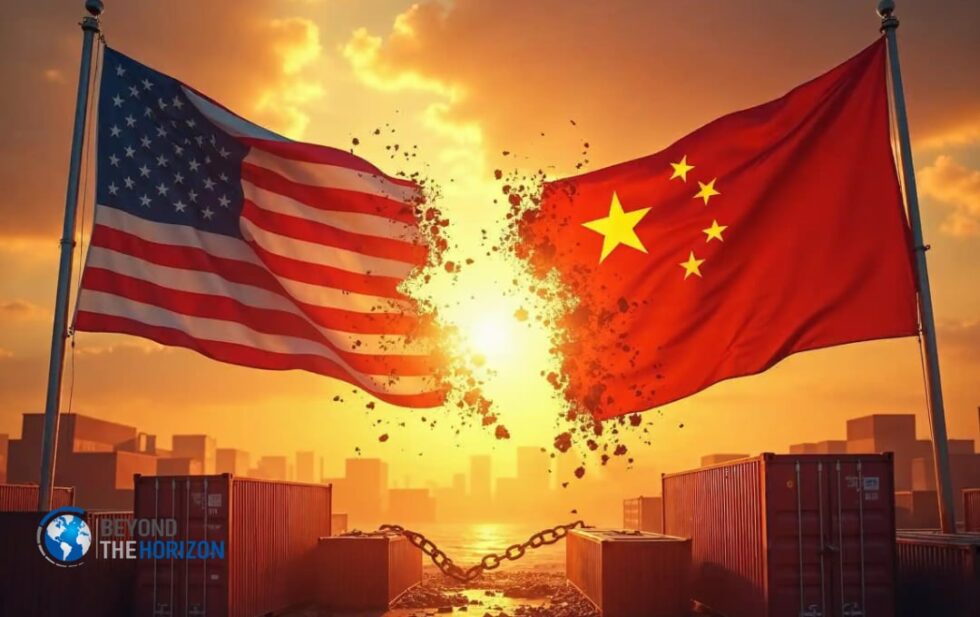Trump's Trade War With Europe: Reasons And Ramifications

Table of Contents
Reasons Behind Trump's Trade Actions Against Europe
The Trump administration's aggressive trade policies towards Europe stemmed from a confluence of factors, including allegations of unfair trade practices, the overarching "America First" policy, and escalating disputes within the World Trade Organization (WTO).
Allegations of Unfair Trade Practices
A central justification for Trump's trade actions was the alleged existence of unfair trade practices by European nations. The administration frequently cited issues such as steel and aluminum imports, imposing tariffs justified on national security grounds. These tariffs, initially targeting numerous countries, disproportionately affected European producers. Furthermore, the Trump administration consistently criticized European Union subsidies to certain industries, arguing that these subsidies created an uneven playing field and harmed American producers.
- Specific Tariffs Imposed: 25% tariffs on steel and 10% on aluminum were imposed, impacting various sectors. Additional tariffs targeted specific European goods in response to retaliatory measures.
- Industries Affected: The steel and aluminum tariffs directly affected manufacturers in both the US and Europe. Retaliatory tariffs from the EU impacted agricultural products and other goods.
- EU Countermeasures: The EU responded with retaliatory tariffs on American goods, further escalating the trade conflict and impacting various industries on both sides of the Atlantic. These countermeasures included tariffs on iconic American products like Harley-Davidson motorcycles and bourbon.
The "America First" Policy
The "America First" policy, a cornerstone of the Trump administration's approach to foreign policy, significantly influenced its trade strategy. This protectionist approach prioritized American interests, aiming to reduce the US trade deficit and protect American jobs. The belief was that trade deals had historically disadvantaged the US, and aggressive measures were needed to redress the imbalance.
- Impact on Trade Negotiations: The "America First" approach led to a breakdown in traditional multilateral trade negotiations and a move towards bilateral deals, often prioritizing short-term gains over long-term strategic partnerships.
- Focus on Bilateral Trade Imbalances: The administration relentlessly pursued a reduction in the US trade deficit, even if it meant disrupting established trade relationships and incurring significant economic costs. This singular focus often overshadowed considerations of broader economic consequences.
- Examples of "America First" in Action: Renegotiation of NAFTA (creating USMCA), withdrawal from the Trans-Pacific Partnership (TPP), and the imposition of tariffs on various goods exemplify the "America First" approach's impact on trade relations.
WTO Disputes and Bilateral Tensions
The Trump administration frequently bypassed or challenged the World Trade Organization (WTO), a multilateral body designed to resolve trade disputes. This circumvention contributed to the escalating tensions with Europe. The administration viewed the WTO as biased against US interests, particularly regarding dispute settlement mechanisms.
- Specific WTO Cases: Several WTO cases involved disputes between the US and the EU over agricultural subsidies, aircraft manufacturing, and other sectors.
- Outcomes and Escalation: Unsatisfactory outcomes in these cases often contributed to the Trump administration's decision to pursue unilateral trade actions, rather than relying on the WTO's dispute resolution processes.
- Impact on Global Trade Governance: The administration's actions undermined the authority and effectiveness of the WTO, creating uncertainty in the global trading system and fostering an environment of increased protectionism.
Ramifications of the Trade War
The Trump administration's trade war with Europe had significant and far-reaching economic and geopolitical consequences, shaping the global trade landscape for years to come.
Economic Consequences
The trade war inflicted economic damage on both the US and European economies, albeit unevenly distributed. Specific sectors, particularly agriculture and manufacturing, were severely impacted.
- GDP Growth Impact: Studies suggest the trade war led to a reduction in global GDP growth. The economic impact was felt differently in different countries, depending on their levels of trade with the US and the EU.
- Job Losses/Gains in Specific Sectors: While some sectors might have experienced short-term gains from protectionist measures, others faced significant job losses due to reduced exports and increased input costs.
- Changes in Consumer Prices: Tariffs led to increased prices for consumers in both the US and Europe, reducing purchasing power and impacting overall economic welfare.
Geopolitical Impacts
The trade conflict significantly damaged transatlantic relations and weakened alliances. The focus on bilateral deals at the expense of multilateral cooperation undermined the foundations of international trade governance.
- Strain on NATO Relations: The trade war exacerbated existing tensions within NATO, raising questions about the reliability of the US as a partner and ally.
- Shifts in Global Trade Partnerships: The trade conflict pushed other countries to explore alternative trade partnerships, potentially weakening the position of both the US and the EU in the global economy.
- Impact on International Cooperation: The Trump administration's approach to trade undermined the principle of multilateralism and weakened international institutions dedicated to resolving trade disputes.
Long-Term Effects on Global Trade
The Trump-era trade war with Europe had a lasting impact on international trade relations, increasing protectionist sentiment globally and posing challenges to trade reform.
- Increased Protectionism: The trade war demonstrated the potential for escalating protectionist measures and the damaging effects on global trade.
- Potential for Regional Trade Agreements: The weakening of multilateral institutions prompted a search for alternative trade arrangements, such as regional trade agreements.
- The Future of the WTO: The challenges faced by the WTO during this period raised concerns about its ability to effectively manage future trade disputes and maintain a rules-based trading system.
Conclusion
Trump's trade war with Europe was driven by a complex interplay of factors, including allegations of unfair trade practices, the "America First" policy, and disputes within the WTO. The ramifications were significant, resulting in economic damage, strained transatlantic relations, and a weakening of multilateral trade governance. The long-term consequences continue to shape the global trade landscape, highlighting the importance of understanding the complexities of this period in US-EU relations. Understanding the complexities of the Trump-era trade war with Europe is crucial for navigating the future of global trade. Further research into the specific impacts on various sectors and the evolving strategies of major economic players is strongly recommended. Continue learning about the ongoing ramifications of this significant period in US-EU trade relations and the evolving global trade landscape. Further exploration into the long-term impacts of this US-EU trade conflict is essential for understanding future trade dynamics.

Featured Posts
-
 The Mia Farrow Sex Scene Michael Caines Unforgettable On Set Experience
May 25, 2025
The Mia Farrow Sex Scene Michael Caines Unforgettable On Set Experience
May 25, 2025 -
 Sejarah Produksi Porsche 356 Di Zuffenhausen Jerman
May 25, 2025
Sejarah Produksi Porsche 356 Di Zuffenhausen Jerman
May 25, 2025 -
 Recent Shooting At Southern Vacation Spot A Look At Safety And Security Measures
May 25, 2025
Recent Shooting At Southern Vacation Spot A Look At Safety And Security Measures
May 25, 2025 -
 Monaco Vs Nice Le Groupe Convoque
May 25, 2025
Monaco Vs Nice Le Groupe Convoque
May 25, 2025 -
 Cassidy Hutchinsons Memoir Key Jan 6 Witness Shares Her Story
May 25, 2025
Cassidy Hutchinsons Memoir Key Jan 6 Witness Shares Her Story
May 25, 2025
Latest Posts
-
 De Minaurs Madrid Open Campaign Ends In Straight Sets Defeat Swiatek Advances
May 25, 2025
De Minaurs Madrid Open Campaign Ends In Straight Sets Defeat Swiatek Advances
May 25, 2025 -
 Iga Swiatek Triumphs In Madrid While De Minaur Suffers Straight Sets Loss
May 25, 2025
Iga Swiatek Triumphs In Madrid While De Minaur Suffers Straight Sets Loss
May 25, 2025 -
 Madrid Open Update De Minaurs Early Exit And Swiateks Dominant Win
May 25, 2025
Madrid Open Update De Minaurs Early Exit And Swiateks Dominant Win
May 25, 2025 -
 Alex De Minaur Out Of Madrid Open After Straight Sets Loss To Opponents Name
May 25, 2025
Alex De Minaur Out Of Madrid Open After Straight Sets Loss To Opponents Name
May 25, 2025 -
 Alex De Minaurs Madrid Open Exit Straight Sets Defeat And Swiateks Victory
May 25, 2025
Alex De Minaurs Madrid Open Exit Straight Sets Defeat And Swiateks Victory
May 25, 2025
